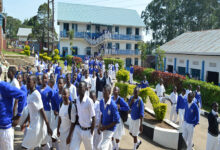The Refugee Malaise And The Futurity Of Uganda
It Must Be Ugandans Themselves To Address The Refugee Malaise In Their Country Before It Is Too late.
Uganda Today: The Refugee Malaise And The Futurity Of Uganda

By Oweyegha-Afunaduula
12th December 2023
I was in Tanzania for 10 years and in Kenya for 10 years.
In Tanzania I was originally a student of Zoology, Botany with Development Studies at the University of Dar-es-Salaam in the very early 1970s. I just missed interacting with President Tibuhaburwa Museveni.
He had left the University in 1970, the year Makerere University, Nairobi University and the University of Dar-es-Salaam itself weaned themselves from the colonial University of East Africa. Soon after graduating with an Upper Second Honours degree in Zoology ( it was very difficult to get a First Class or Upper Second Honours degree those days, unlike today), I joined the defunct East African Community (EAC) and was based in Zanzibar as a Senior Fisheries Research Officer in the East African Marine Fisheries Research Organization (EAMFRO). When the EAC collapsed in 1977, the Tanzania Government employed me as a Research Zoologist in the Tanzania National Parks (TNP).

I left Tanzania in 1980 following the ouster of Idi Amin from power in Uganda in 1979 by the loosely
combined rebel forces of Apollo Milton Obote's Kikosi Malum and Yoweri Museveni's Front for National Salvation (FRONASA).
I stayed in Uganda for nearly 6 months during the reign of Uganda National Liberation Front (UNLF) but soon left for Kenya to study for a Masters degree in Zoology (The Biology of Conservation) at the Chiromo Campus of the University of Nairobi. After graduation I served the Kenya Teachers Service Commission (KTSC) as a Senior Secondary School teacher of Biology and Geography. I never heard of Kenyans calling me Mukimbizi (refugee), but I was. I don't know whether to say that Kenyans were less discriminative against Ugandans than Tanzanians were. The Tanzanians openly called me Mukimbizi.
Otherwise both Kenya and Tanzania were very hospitable to me. I am grateful for the knowledge, wisdom, understanding, insights and experience I got while in the two countries. They have been invaluable to me. I left Kenya in early 1991 to join Makerere University as a lecturer in the Department of Zoology, Faculty of Science.
Both Kenya and Tanzania were very sensitive to refugees penetrating their cultures, sociopolitics and governance. In the two countries the nationals told me they could never allow me to acquire land. They also told me they would never allow me to participate in their elections and politics. I was called Mukimbizi (refugee) in Tanzania. No wonder Kenya and Tanzania have never allowed the numbers of refugees to rise above a few hundreds. And they safeguard the leadership and governance of their people from being polluted by refugees or refugee interests.
It is only in Uganda where refugees freely flow like a river, settle easily, acquire land easily, get
employed easily, own businesses easily, evade paying taxes easily, acquire citizenship, even dual
citizenship easily, become members of Parliament easily, participate in elections easily, and
government, perhaps unintentionally, treats them a stage higher than the indigenous Ugandans.
Perhaps unsurprisingly, the government plans to borrow trillions of Shillings to educate their children in the best schools and universities in the world. Research shows that many refugees or former refugees, constitutionally nationalists and citizenized, now occupy the juiciest jobs in the country.
Unfortunately our university researchers have not taken the issue of refugees as a good theme from which to formulate problems for research. Researchers tend to formulate what they call politically insensitive problems. Indeed in Uganda the issue of refugees is highly politically sensitive and remains a largely no-go area for academics, of course to the disadvantage of Ugandans. So, most Ugandans remain ignorant of the harm refugees are exacting on their livability and survival in the medium and long-term.
Long ago, in 1995, the late Prof Foster Byarugaba and myself wrote a paper for presentation at an
ecological politics consultation at the University of Louvain, Brussels, Belgium, on human population displacements, and which I presented,. The paper was titled "The Environmental Impact of Refugees in Africa: Suggestions for Action". We detailed the impacts. However, there is no sphere of human life and activity and no resource base that has not need affected by refugees in the second or third most hospitable Country to refugees in the whole world – Uganda.
It must be Ugandans themselves to address the refugee malaise in their country before it is too late. They have allowed it to mushroom, proliferate and penetrate everywhere and to be central to
everything in the country.
Usually it would be the intellectual space to articulate and clarify the issue to the unaware society.
However, power strategically stifled intellectual activity in the country. Even at Ugand's universities, there is no longer active intellectual debate and interaction. It is all academicism and scholasticism.
Meanwhile, our politicians are engaged in trivialities. Real issues are trivialized and non-issues are
glorified. Accordingly, a lot of time, energy and money, that would otherwise be invested in
development, transformation and progress on Uganda and Ugandans, is wasted on themselves, their political schemes and the multifariously ill-fated projects and programmes. If Uganda is a failed State with failed leadership, then it is not difficult to explain why. Simply sad for ourselves and future generations of Ugandans! The futurity of Uganda and Ugandans is doomed! The refugee malaise, not malaria, Ebola or Covid 19, is the reason! Unfortunately!.









